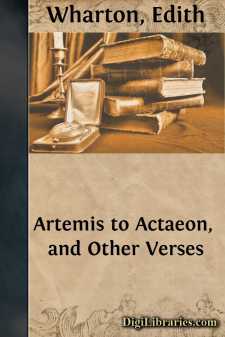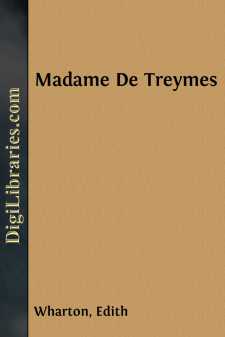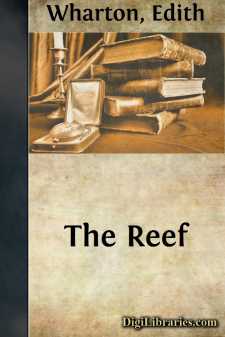Categories
- Antiques & Collectibles 13
- Architecture 36
- Art 48
- Bibles 22
- Biography & Autobiography 813
- Body, Mind & Spirit 142
- Business & Economics 28
- Children's Books 17
- Children's Fiction 14
- Computers 4
- Cooking 94
- Crafts & Hobbies 4
- Drama 346
- Education 46
- Family & Relationships 57
- Fiction 11829
- Games 19
- Gardening 17
- Health & Fitness 34
- History 1377
- House & Home 1
- Humor 147
- Juvenile Fiction 1873
- Juvenile Nonfiction 202
- Language Arts & Disciplines 88
- Law 16
- Literary Collections 686
- Literary Criticism 179
- Mathematics 13
- Medical 41
- Music 40
- Nature 179
- Non-Classifiable 1768
- Performing Arts 7
- Periodicals 1453
- Philosophy 64
- Photography 2
- Poetry 896
- Political Science 203
- Psychology 42
- Reference 154
- Religion 513
- Science 126
- Self-Help 84
- Social Science 81
- Sports & Recreation 34
- Study Aids 3
- Technology & Engineering 59
- Transportation 23
- Travel 463
- True Crime 29
Edith Wharton
Edith Wharton (1862-1937) was an American novelist and short story writer best known for her works exploring the lives and morals of the American upper class, including her Pulitzer Prize-winning novel "The Age of Innocence." Her writing style combined keen social observation with vivid, detailed prose, making her a significant literary figure of the early 20th century. Wharton was also an accomplished designer, traveler, and the first woman to win the Pulitzer Prize for Fiction.
Author's Books:
Sort by:
by:
Edith Wharton
I "Undine Spragg—how can you?" her mother wailed, raising a prematurely-wrinkled hand heavy with rings to defend the note which a languid "bell-boy" had just brought in. But her defence was as feeble as her protest, and she continued to smile on her visitor while Miss Spragg, with a turn of her quick young fingers, possessed herself of the missive and withdrew to the window to read...
more...
by:
Edith Wharton
THE MUSE'S TRAGEDY Danyers afterwards liked to fancy that he had recognized Mrs. Anerton at once; but that, of course, was absurd, since he had seen no portrait of her—she affected a strict anonymity, refusing even her photograph to the most privileged—and from Mrs. Memorall, whom he revered and cultivated as her friend, he had extracted but the one impressionist phrase: "Oh, well,...
more...
by:
Edith Wharton
PART I It is not often that youth allows itself to feel undividedly happy: the sensation is too much the result of selection and elimination to be within reach of the awakening clutch on life. But Kate Orme, for once, had yielded herself to happiness; letting it permeate every faculty as a spring rain soaks into a germinating meadow. There was nothing to account for this sudden sense of beatitude; but...
more...
by:
Edith Wharton
I Having begun my book with the statement that Morocco still lacks a guide-book, I should have wished to take a first step toward remedying that deficiency. But the conditions in which I travelled, though full of unexpected and picturesque opportunities, were not suited to leisurely study of the places visited. The time was limited by the approach of the rainy season, which puts an end to motoring over...
more...
by:
Edith Wharton
ARTEMIS TO ACTAEON THOU couldst not look on me and live: so runs The mortal legend—thou that couldst not live Nor look on me (so the divine decree)! That saw'st me in the cloud, the wave, the bough, The clod commoved with April, and the shapes Lurking 'twixt lid and eye-ball in the dark. Mocked I thee not in every guise of life, Hid in girls' eyes, a naiad in...
more...
by:
Edith Wharton
I John Durham, while he waited for Madame de Malrive to draw on her gloves, stood in the hotel doorway looking out across the Rue de Rivoli at the afternoon brightness of the Tuileries gardens. His European visits were infrequent enough to have kept unimpaired the freshness of his eye, and he was always struck anew by the vast and consummately ordered spectacle of Paris: by its look of having been...
more...
by:
Edith Wharton
I The village lay under two feet of snow, with drifts at the windy corners. In a sky of iron the points of the Dipper hung like icicles and Orion flashed his cold fires. The moon had set, but the night was so transparent that the white house-fronts between the elms looked gray against the snow, clumps of bushes made black stains on it, and the basement windows of the church sent shafts of yellow light...
more...
by:
Edith Wharton
I A girl came out of lawyer Royall's house, at the end of the one street of North Dormer, and stood on the doorstep. It was the beginning of a June afternoon. The springlike transparent sky shed a rain of silver sunshine on the roofs of the village, and on the pastures and larchwoods surrounding it. A little wind moved among the round white clouds on the shoulders of the hills, driving their...
more...
by:
Edith Wharton
"Unexpected obstacle. Please don't come till thirtieth. Anna." All the way from Charing Cross to Dover the train had hammered the words of the telegram into George Darrow's ears, ringing every change of irony on its commonplace syllables: rattling them out like a discharge of musketry, letting them, one by one, drip slowly and coldly into his brain, or shaking, tossing, transposing...
more...
by:
Edith Wharton
Mrs. Ballinger is one of the ladies who pursue Culture in bands, as though it were dangerous to meet alone. To this end she had founded the Lunch Club, an association composed of herself and several other indomitable huntresses of erudition. The Lunch Club, after three or four winters of lunching and debate, had acquired such local distinction that the entertainment of distinguished strangers became...
more...











